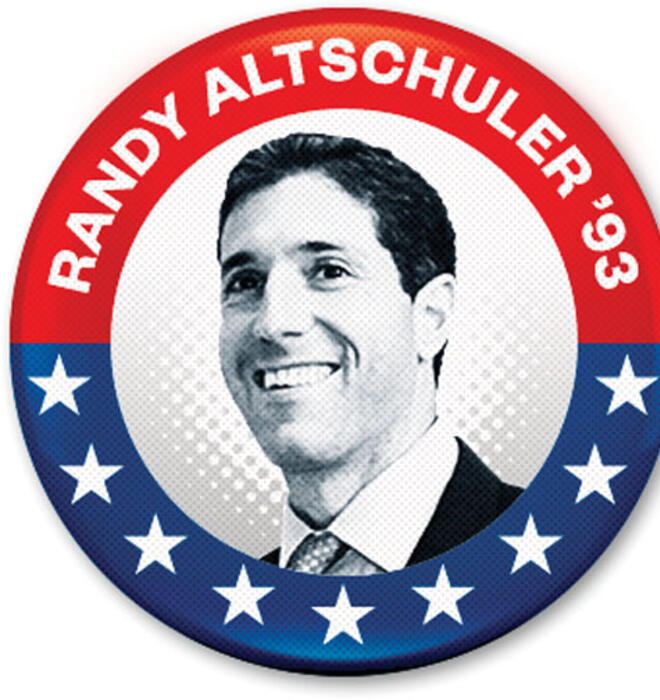
Running the Race
Despite the state of politics, these alumni don’t regret their trips down the campaign trail
Randy Altschuler ’93 was in Washington, attending the orientation for newly elected members of Congress in 2010, when the heady experience came to an abrupt halt. Back on Long Island, the absentee ballots still were being counted in what turned out to be the closest congressional race of that year. When it was finally over, Altschuler had fallen short.
For the first-time Republican candidate, it was a disappointing end to a long, brutal campaign. It had started with an ugly three-way primary battle in which Altschuler faced a former prosecutor and Christopher Cox ’01 — the son of New York GOP chairman Ed Cox ’68 and a grandson of President Richard Nixon. Cox had the backing of the Tea Party; Altschuler, of the Conservative Party. “Unfortunately,” he says now, “it became a race to the right.” Altschuler won.
Then came the general election. Altschuler, a businessman and former Wall Street banker, used nearly $3 million of his own money to try to defeat four-term Democratic congressman Tim Bishop. When it was over, Altschuler had lost by 593 votes out of about 194,000 cast.
Two years later, Altschuler made another run. Again, he faced Bishop in a rancorous campaign. Again, he lost — this time by a wider margin.
Still, after two disappointments in a row, Altschuler has emerged not more cynical about the political system, but less so. He isn’t planning to launch another political campaign anytime soon, and there were parts of campaigning he detested: “the politics itself — the pettiness, the wasted time, the whole political establishment.” But the experience also put Altschuler — a former member of the Green Party who rarely had voted before his congressional race — in touch with a new culture and a new perspective. “What a special country we have,” he says. “To see so many people involved in the political process, I think that is awesome.”
There are more than half a million elected officials in the United States, the vast majority serving in local government offices. That’s where the main focus will be in next month’s off-year election, when thousands of people will be scrambling to fill seats on school boards, municipal councils, and in some statehouses. PAW interviewed about a dozen alumni with firsthand experience as candidates, including those who were unsuccessful. For some, defeat was a highly visible encounter with failure. Yet at a time when public esteem for politics and the people who practice it is sinking fast, and campaigns can be exhausting and uncivil, few alumni regret trying.
They do not sugarcoat the downsides. The endless slog for campaign cash is “humiliating,” says Ravi Sangisetty ’03, a Louisiana Democrat who estimates he spent 35 hours a week cadging contributions during his unsuccessful 2010 congressional campaign. Private life is nonexistent: “I give out my cellphone number to thousands of people,” says Cincinnati City Councilman P.G. Sittenfeld ’07, a former Marshall scholar. Some have seen hyper-partisanship get in the way of their idealistic agendas: “There’s a reason Congress is held in lower regard than head lice and colonoscopies,” says Rep. Derek Kilmer ’96, a former Democratic state representative in Washington who won a seat in Congress in 2012.
“There were times when I would say, ‘This is the worst job interview ever,’” says Nicole Velasco ’08 of her 2012 campaign for a seat in Hawaii’s state legislature. She deliberately had staffed her campaign with her contemporaries, all political rookies, because she wanted to explode the stereotype of young people being politically apathetic. Ultimately, some of those young people probably learned an unwanted lesson: Velasco lost her race by 120 votes under circumstances so suspicious, they gave rise to widespread accusations that her opponent was involved in voter fraud.
Other aspects of the race were disillusioning. At a Reunions panel last spring, Velasco lamented, “I had all these ideas about programs and politics I wanted to introduce, and quite frankly, no one cared.” Her father often campaigned door-to-door with her, partly to counter rumors in her tightly knit community about her cultural heritage (she is Filipina). When she lost, she was crushed, she says. Yet she insists that she “grew along the way” and now is more committed to public service, with a job in the office of the mayor of Honolulu.
Why endure such indignities? Some point to a long-held idea that they could contribute to their communities, while others come to it almost haphazardly; some note that the network they develop through political involvement can help them achieve other personal and professional goals. Sangisetty acknowledged during his campaign that he had been “pretty much apolitical” — he did not even vote in the 2008 presidential election — until, as a law clerk and lawyer, he had to deal with issues related to Hurricane Katrina. “I got a firsthand look at how Washington truly is broken,” he told a local newspaper. “That’s when I wanted to raise the level of debate and talk about the things that really matter to the people of south Louisiana.” Andrew Blumenfeld ’13, appalled by the lack of competition for a school board seat in the suburban Los Angeles district where he grew up, got into the race to make a point and ended up winning; he spent his senior year shuttling back and forth between coasts. Garrett Brown ’09 ran successfully for the city council in Albion, Mich. (pop. 8,500), after volunteering as a Census worker during the first summer after his graduation. Brown, whose family was part of the great migration of Southern blacks to Northern factory towns, found himself in “parts of town that I had driven by but never walked through,” he says. “I learned a little bit more about my town.”
Jen DePalma ’96, who moved to San Francisco after graduating from the University of Chicago law school, says her quixotic 2004 campaign against a Democratic icon — Rep. Nancy Pelosi of California — started as a lark but ended as a life-changing experience. “Before the campaign, I was academically political,” says DePalma, who had enjoyed advancing her libertarian point of view at Whig-Clio. But the idea of being part of a grassroots effort — “the door-to-door” — was foreign to her. The Republican Party needed someone who could develop a following in the liberal district, and DePalma’s youth, gender, and iconoclastic ideology recommended her. “I’m pro-choice and pro-gay marriage,” she says. Party leaders “cleared the primary for me. They told me, ‘It’ll really just be lunches and happy hours.’” It was a lost cause — Pelosi got 82 percent of the vote — but DePalma’s campaign turned out to be an intensive introduction to her new city and changed her career. She now does pro bono work for GOP causes and candidates while working for a law firm that encourages political activity “on both sides of the aisle.”
Several candidates — successful and unsuccessful alike — say the worst part of campaigning is begging others for money. “The problem with raising money is it takes you from other duties,” says Rep. Jared Polis ’96. “It distracts us.” The Colorado Democrat, an Internet entrepreneur, was able to stake himself with $6 million of his own money for his first campaign. Others aren’t so lucky.
When Terri Sewell ’86 launched her campaign for a House seat in her sprawling Alabama district in January 2010, only about 7 percent of her potential constituents recognized her name. To remedy that, she launched an advertising campaign — but she needed money to pay for it. Sewell hated making the fundraising calls so much that in the middle of her campaign, one of her finance directors found her thesis — a tome entitled “Black Women: Our Time Has Come” — and made her read it. Sewell found her youthful voice a clarion call: “In many ways, I was talking to my 40-year-old self.”
Like a number of alumni, she says she found her Princeton network invaluable. In the beginning of her campaign, she says, “the bulk of my money came from Princeton classmates, friends, and teachers,” and one mentor arranged for former Democratic Sen. Bill Bradley ’65 to headline a New York City fundraiser for her. Others, too, tapped an orange-and-black vein of campaign cash.
The candidates also relinquished any expectation of privacy. Sewell, who is single, says she regularly faced, and still faces, pointed questions about her marital status, including some from constituents who advised her that “you should be trying to find a husband” rather than running for Congress. “I hear it visiting churches,” says Sewell, who adds that she has come to agree with something the trailblazing former Rep. Shirley Chisholm told her in an interview for her thesis: Of the two factors that shaped her political life — being black and being a woman — “unequivocally, being a woman” presented the most prejudices to overcome.
Polis, the first non-incumbent, openly gay man elected to Congress, and Democrat Jacob Candelaria ’09, a gay man who won a seat in New Mexico’s state Senate, both say they found it necessary to discuss aspects of their lives that had nothing to do with public policy while they were on the campaign trail. Polis pre-emptively addressed his sexual orientation in a newspaper article. “It had to be officially known,” he says. “It’s something straight politicians don’t have to do. They don’t have to go on the record and say they’re straight.”
In Cincinnati, Sittenfeld is aware that anything he does could be grist for a gossip mill. So, compared with most 20-somethings, “I probably have a less traditional social life,” he says. “I try to keep it tame.”
Some of the alumni have second thoughts about how they ran their races. Altschuler, for example, says he wishes he had not allowed consultants to overrule his own best instincts. He explains that he spent “way too much money and time” making an issue of an alleged ethics violation by his opponent in the general election, rather than focusing on the bread-and-butter issues facing voters. (The ethics charge against Bishop is under investigation by Congress.) “These guys sort of convinced me [to follow that strategy], and shame on me,” Altschuler says. “I knew it wasn’t the right thing.”
Still, despite such misgivings, the alumni focus on the rewards of public life. Kilmer wrote his senior thesis for the Woodrow Wilson School on the challenges facing communities that suffered job losses because of the timber crisis — communities like the Washington state town of Port Angeles, where he grew up. Now he represents his hometown on Capitol Hill, and economic development remains at the top of his agenda. Polis says his office has reunited families separated by immigration issues and helped hundreds of so-called Dreamers — young people who grew up in the United States after being brought here illegally by their parents — gain a more secure legal foothold. Sewell got to usher relatives of four little girls killed in the infamous 1963 Birmingham church bombing into the Oval Office, where the president of the United States told them he would not be in office without the sacrifices of civil-rights pioneers. “I will never, ever forget it,” Sewell says.
Some see even the negatives of campaigning as a positive: “It was an amazing experience — shaking 25,000 hands, asking people for money, having people say no, having people yelling at me,” says Sangisetty of his unsuccessful race. “I had an opportunity as a young person to experience other people’s lives and understand what they were going through in their lives. You can’t teach that in school.”
While Sittenfeld says he can “understand people’s cynicism about politics,” he considers it unproductive. “I want young, optimistic, hardworking people to go into politics, so that collectively people don’t feel as much cynicism about the political process,” he says.
He is, he admits, an optimist himself: “I do not feel jaded or cynical yet, one bit.”
Kathleen Kiely ’77, a former political reporter for National Journal and USA Today, is managing editor at the Sunlight Foundation.


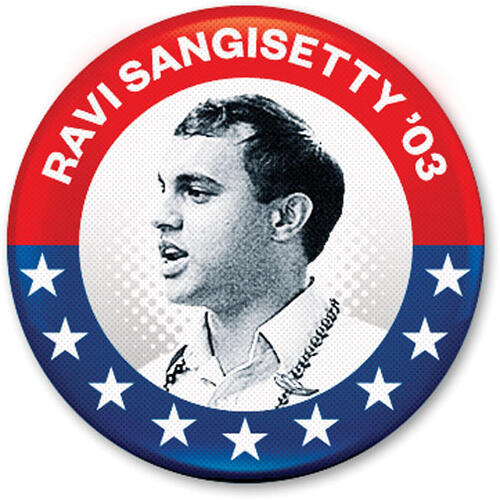
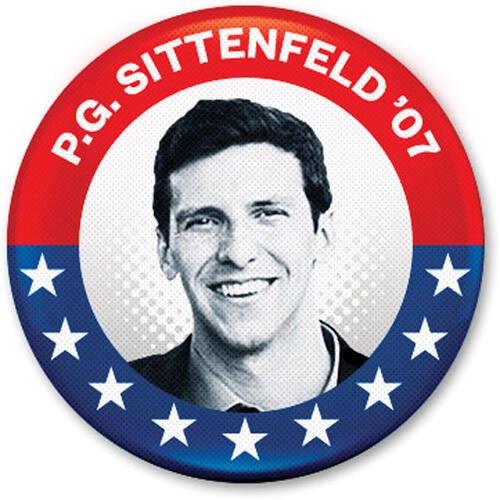
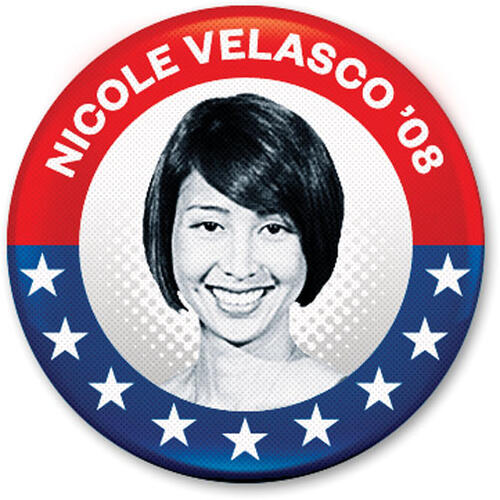
![C-Jen_DePalma.jpg “I’m pro-choice and pro-gay marriage. ... [Party leaders] cleared the primary for me.”](/sites/default/files/styles/cke_media_resize_medium_height_500/public/images/content/C-Jen_DePalma.jpg?itok=rvidz8xT)
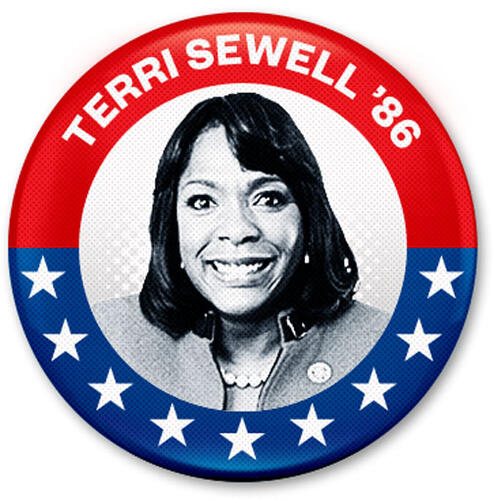




No responses yet